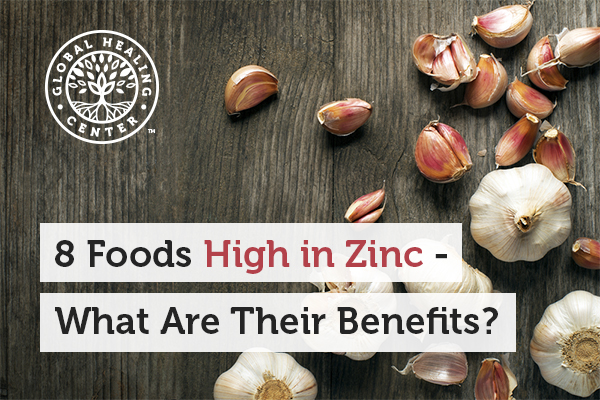
Zinc is necessary for many of the body's processes and most people are deficient in this vital mineral. It is an active agent in our body's ability to metabolize food and nutrients. It assists with triggering over 100 differing internal enzymes required for many metabolic actions. Zinc is also crucial for the immune system. It supports growth through its role in protein building and synthesis and is therefore particularly needed by pregnant and lactating women.
Zinc also plays a role in the body's ability to heal itself after an injury. Zinc supports your sense of smell and is commonly linked to healthy eyes, skin, and hair. We must ensure that we get enough zinc in our diet, potentially from zinc supplements, as the body does not naturally have a zinc storage system.

Foods High in Zinc
Length: 2 minutes
8 Foods High in Zinc
Like most other nutrients, the best way to obtain zinc is through a healthy diet. There are many foods that contain zinc, but the following possess the most naturally-occurring zinc among plant-based foods. These foods are a great addition to any diet.
1. Pumpkin seeds
Not only are they extremely high in zinc but pumpkin seeds also play a role in the prevention of prostate cancer. Pumpkin seeds also support immune system health. For maximum zinc-intake, the seeds should be eaten raw, as roasting them can deplete their zinc content.
2. Dark Chocolate
The occasional indulgence in a square of dark chocolate may offer a boost to your zinc levels. One hundred grams of unsweetened dark chocolate has up to 9.6 mg of zinc. Cocoa powder has 6.8 mg.
3. Garlic
This pungent bulb offers moderate levels of naturally occurring zinc and is easy to incorporate into almost any meal. Garlic is also a great food for detox that contains high levels of manganese, vitamin B6, vitamin C, and selenium.
4. Sesame Seeds
Raw, toasted or ground into tahini butter, sesame seeds hold around 10 mg of zinc per 100g serving. Try incorporating more hummus (a tahini-butter-based Middle Eastern dip) into your diet, or even consider replacing wheat flour with sesame seed flour in your baked goods or bread.
5. Watermelon Seeds
It may seem strange, but dried watermelon seeds have 10 mg of zinc per 100g serving. Try adding watermelon with seeds to your smoothies!
6. Cashews
Several nuts contain high levels of zinc, including almonds and pine nuts, but cashews pack the most. One ounce contains 15 percent of your zinc daily value (DV).
7. Squash Seeds
Another popular Middle Eastern seed, squash seeds contain around 10 mg of zinc per 100 g serving. You can remove the seeds directly from the squash and eat them raw, or dry or roast them in your oven. I prefer raw.
8. Chickpeas
A 7-ounce serving contains about 2.8 mg of zinc. They also contain folate and are high in protein and dietary fiber.
Other Sources of Zinc
Aside from the foods listed above, there are other ways to get zinc in your diet. If you don’t eat many of the foods above, I recommend supplementing your diet with zinc. A great choice is Global Healing’s liquid Zinc supplement, derived from organic guava leaves, with Energized Trace Minerals™ to maximize absorption and optimize benefits.
If you decide to take a supplement, be sure to do your research on the different types of zinc supplements: They are not all created equal.

†Results may vary. Information and statements made are for education purposes and are not intended to replace the advice of your doctor. If you have a severe medical condition or health concern, see your physician.








